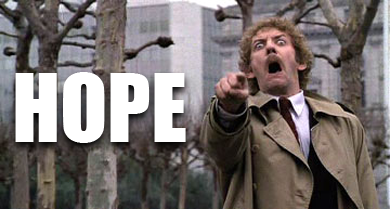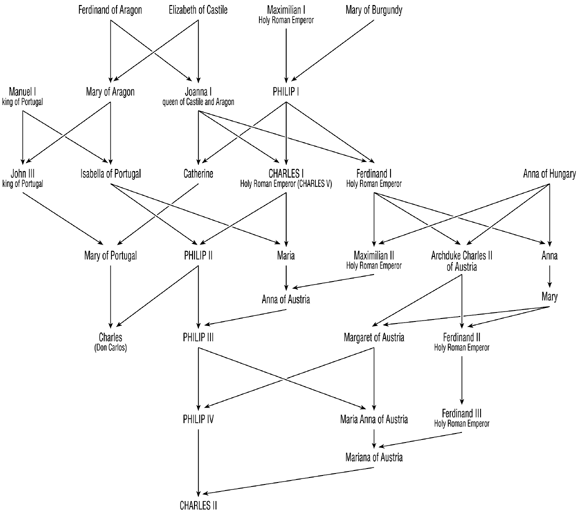 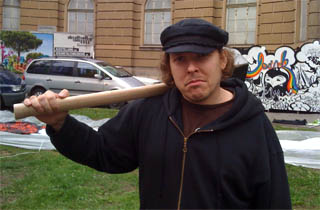 In the 1960s and 1970s the "joint" was a radical symbol of counter-culture, a strong gesture of social revolution. But such icons of subculture – such subcultural "memes" – appear, just to be hollowed out by the harsh waves of normativity. After a short period of time the symbol climbs up the career-ladder. And what remains is a footnote in the endless realms of bourgeois history (or even worse: bourgeois art history). Our sculpture is as blunt and boring as that. It's a somewhat classical portray of what happens to subcultural icons once they are sucked in and became global players in the field of symbols of freedom and coolness in a sadly cool and monotonous "free world". 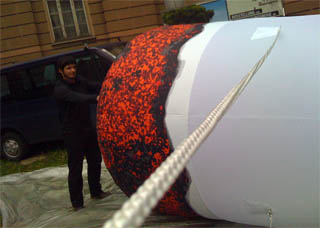 What is left of the radicality and political message of the joint? What is left of its shining glory of "fuck them all?" Well, consuming pot is a minor offense (thankfully) kept alive by administration. It's more a trade-off than a subversion anymore. It's a "yeah, it's somehow wrong to do it, but well, you know, yeah" kind of approach. And what is subversion anyways? Just a direct path into the dark dungeons of guerrilla marketing? We have to find ways around a very-late-capitalist system that actually want us to be subversive. How can you subvert something that wants you to break rules? Well... we are working on it. Don't Vietcong us - we'll Vietcong you! 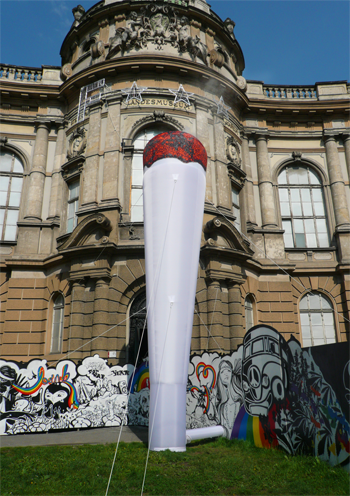 (Crazy! It's smoking!) Link Dorkbot Vienna #7: Walter Langelaar  nOtbOt is an automated game-player which is controlled and deranged by reactions to it's own virtual environment, caught in a vicious force-feedback loop...Sunday, May 3, 2009. 7 PM @ Metalab Vienna (Rathausstrasse 6, 1010 Vienna) Link Lip-reading software picks out your language Can you tell what language somebody is speaking just by watching the shapes their lips make? A computer developed at the University of East Anglia in Norwich in the UK can, and it could lead to automatic lip-reading and translation systems for deaf people.Link Vicken Cheterian on the Georgian conflict Until recently, Georgia's wars were fought against separatist movements of ethnic minorities. In August 2008 it took on the Russian army. In this podcast, George Miller talks to journalist and political analyst Vicken Cheterian about the nature of the five-day war and its consequences for the Caucasus and beyond.
Link (MP3, podcast) Glass harp version of "There's No Limit" The Lord Is Love. And... Could Food Shortages Bring Down Civilization? The biggest threat to global stability is the potential for food crises in poor countries to cause government collapse.
Key ConceptsLink Avatars, attorneys in new world of virtual law Like so many things, virtual law started with sex. Specifically, the first known legal case originating in a virtual world was over a bed designed for rolls in the virtual hay.Link The Frock-Coated Communist: The Revolutionary Life of Friedrich Engels Alone amid the Manchester 19th-century "cottonocracy", Friedrich Engels hoped for the British economy's collapse and was carefree about losing his fortune forever. That alone would have made him the most extraordinary capitalist. But of course we have a further reason to remember him: Engels and his friend Karl Marx were communists. Together they developed a theory proclaiming the inevitable fall of capitalism; and neither of them would have been as surprised as most of our financial commentators have been by the world economy's vulnerability to the rapacity and irresponsibility of bankers.Link "Nazi Petting Zoo" on "The Art of the Prank" Calling for a Coal Moratorium: Interview with Ted Nace Ted Nace is the author of Gangs of America: The Rise of Corporate America and the Disabling of Democracy. In 1985 he founded Peachpit Press and has worked as a freelance writer and served as staff director of the Dakota Resource Council, helping rural communities deal with the impact of strip mines and power plants. More recently Nace has turned his energies toward the anti-coal movement and co-founded CoalSwarm, created in collaboration with the Center for Media and Democracy, which provides an ever expanding body of online information for anyone to access and contribute to. CoalSwarm is a project of the Earth Island Institute, which was founded by environmental pioneer David Brower. Nace recently spoke with Joshua Frank about CoalSwarm, the Obama administration's energy policy, and the current state of the anti-coal movement.
Link Burger Grease Art In Defense of Common English Nice piece by Ben Yagoda about protesting grammar mavens.
Not long ago, I took part in a panel discussion at the Free Library of Philadelphia. My fellow panelists were two linguists and a lexicographer. Anyone who knows any linguists and lexicographers will be unsurprised to hear that their position on usage was descriptive rather than prescriptive: They were interested in charting and interpreting recent and historical changes in the way English is written and spoken, not interested in labeling those changes as "mistakes," and even less interested in decrying such so-called errors as evidence of a decline in American civilization.Link Monsters vs. Aliens: Why Terrorists and Pirates Are Not About to Team Up Any Time Soon In the comic books, bad guys often team up to fight the forces of good. The Masters of Evil battle the Avengers superhero team. The Joker and Scarecrow ally against Batman. Lex Luthor and Brainiac take on Superman.Link The Challenge of Moral Machines Wendell Wallach tells us what the basic problems are.
LinkIf a train continues on its current course, it will kill a workcrew of five down the track. However, a signalman is standing by a switch that can redirect the train to another branch. Unfortunately, a lone worker will be killed if the train is switched to the new track. If you were the signalman, what would you do? What should a computer or robot capable of switching the train to a different branch do?Philosophers are fond of thought experiments that highlight different aspects of moral decision-making. Responses to a series of different dilemmas, each of which poses saving several lives by deliberately taking an action that will sacrifice one innocent life, illustrate clearly that most people's moral intuitions do not conform to simple utilitarian calculations. In other words, for many situations, respondents do not perceive that the action that will create the greatest good for the greatest number is the right thing to do. Most people elect to switch the train from one track to another in order to save five lives, even when this will sacrifice one innocent person. However, in a different version of this dilemma there is no switch. Instead, you are standing on a bridge beside a large man. You can save five lives down the track by pushing the man to his certain death off the bridge into the path of the onrushing train. With this variant, only a small percentage of people say they would push the man off the bridge. ATM For Books? Launching in London today, the Espresso Book Machine can print any of 500,000 titles while you wait.
Link Curry and identity: Does food act like a historical text? In 1972, the anthropologist Mary Douglas wrote about the cultural significance of meals and mealtimes. "Deciphering a meal" demonstrated that food is just as evocative a form of communication as language. As with the words we speak or write, so the food we eat is crucially linked to the way we think about ourselves: food reveals who we are, what we might stand for, and, perhaps most problematically, what we were had not the world divided us. Meals internalize and structure the outside world in a literal way and beyond, and with immigrants this connection is exaggerated. Near or far, our homelands are reinvented and reinscribed by the food we eat. But does food act like a historical text? What is food a record of exactly?Link Freedom from lice may have led to modern allergies It is well established that intestinal parasites dampen mammalian immune reactions. But in a surprise result, scientists have found that another kind of parasite – the body louse – does too. That means the epidemic of allergic disorders in modern, urban people might be due to our having rid ourselves of lice and worms.Link Cassini Probe: Breathtaking pictures of Saturn NASA's Cassini spacecraft is now a nearly a year into its extended mission, called Cassini Equinox (after its initial 4-year mission ended in June, 2008). The spacecraft continues to operate in good health, returning amazing images of Saturn, its ring system and moons, and providing new information and science on a regular basis. The mission's name, "Equinox" comes from the upcoming Saturnian equinox in August, 2009, when its equator (and rings) will point directly toward the Sun. The Equinox mission runs through September of 2010, with the possibility of further extensions beyond that. Collected here are 24 more intriguing images from our ringed neighbor.  Link (via oewf) Arse Elektronika Anthology: We are looking for illustrations  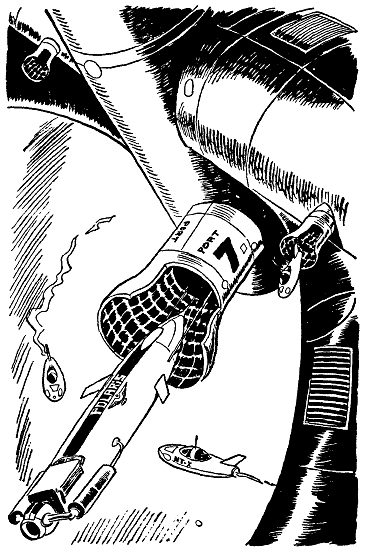 We are still looking for illustrations and graphic works (b/w or greyscale) that deal with the general theme of the publication. Please send us an email if you think you have some interesting stuff... Deadline: May 10, 2009. Guerrilla Comm? Waging War on Reality  Talk given by monochrom's Johannes Grenzfurthner at SXSWi (2007).  Guerrilla communication tries to understand the processes by which the media come up with social frameworks of behaviour and perception. And by understanding what's going on here it also tries to introduce tiny symbolic changes to that system in order to make people suspicious of the information, wanting to understand the ideological structure and goal it transports. Guerrilla communication urges us to reconsider what we believe (and also what we believe to believe) and whom we do believe and why. Moreover, it tries to point out that media is forcing Gleichschaltung ("alignment") onto people, by censoring facts that don't fit in the picture. And it tells us that information and the media should be free. Maybe one should mention Wikipedia in this context. But most of the people involved do not realise that there's no such thing as free media in a capitalist bourgeois and liberal society. A free good on the free market would be either a nice gadget, a simple free-be, a marketing tool for something else or merely a paradox. If you disagree feel free to come up with an existing example which doesn’t fit in any of these categories.Link Soldiers as street fighters: France's urban war games When war became urban (Berlin in 1945, or more recently Chechnya) cities and people were ravaged. Now, given the rise in population of towns and cities, the French army must familiarise itself with more subtle warfare where all-out destruction is not an option.
Link Images of a Lost World: East Germany When a West German photographer set off on a trip to the East German island of Rügen just after the Wall fell in the spring of 1990, he captured a world that would soon disappear forever. Twenty years after the epochal event, he looks back on his journey in a first-person account.
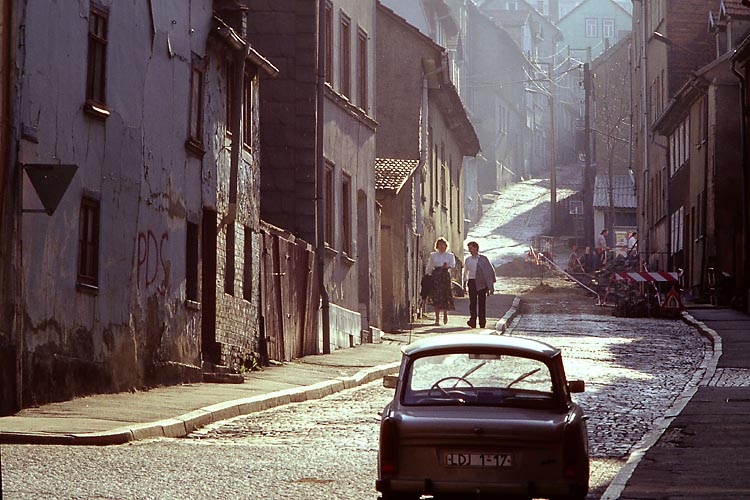 Link Longing for Great Lost Works: From Shakespeare's 'Cardenio' to Ovid's Getic poetry, missing texts hold tantalizing possibilities In 1995 Unesco named April 23 World Book Day because of a morbid literary coincidence. Both William Shakespeare and Miguel de Cervantes died April 23, 1616, the same exact date but 10 days apart, since England was on the Julian Calendar while Spain was on the Gregorian. It's a fortunate coincidence (or near coincidence) because collectively, they produced one of the greatest missing literary works of all time, the play "Cardenio." And on World Book Day I always find myself thinking about the books that don't exist more than the ones that do.Link Same fight, different decade: Dave Dempsey about Copyfighting #fullboycott Disney, Casino Capitalism and the Exploitation of Young Boys Casino capitalism may be getting a bad rap in the mainstream media, but the values that nourish it are alive and well in the world of Disney. As reported recently in a front-page article in The New York Times, Disney is in the forefront of finding ways to capitalize on the $50 billion dollars spent worldwide by young boys between the ages of 6 and 14. As part of such efforts, Disney has enlisted the help of educators, anthropologists and a former researcher with "a background in the casino industry" to not only study all aspects of the culture and intimate lives of young boys, but to do so in a way that allows Disney to produce "emotional hooks" that lure young boys into the wonderful world of corporate Disney in order to turn them into enthusiastic consumers.Link The Hawthorne Effect: Why parents swear by ineffective treatments for autism Autism can present in many ways—hence "autism spectrum disorders"—but that range is nothing compared with the diverse techniques that parents use in their attempts to cure, ameliorate, or disrupt the progress of the disease. In the 60-plus years since autism was first described, many methods to treat it have been proposed—one research paper identified 111 recognized treatments or strategies. Studies have found that parents try an average of between 4.3 and seven interventions simultaneously; one family reported using 47 different treatments at one time.Link Typeface Inspired by Comic Books Has Become a Font of Ill Will Vincent Connare designed the ubiquitous, bubbly Comic Sans typeface, but he sympathizes with the world-wide movement to ban it.Link #fullboycott / help the Pirate Bay  Time to start a #fullboycott of media products in order to help the Pirate Bay guys. Some folks just lost a couple of bucks. twitter #fullboycott technorati fullboycott The unfortunate uselessness of most 'state of the art' academic monetary economics Standard macroeconomic theory did not help foresee the crisis, nor has it helped understand it or craft solutions. This columns argues that both the New Classical and New Keynesian complete markets macroeconomic theories not only did not allow the key questions about insolvency and illiquidity to be answered. They did not allow such questions to be asked. A new paradigm is needed.Link Humans are distance runners, just check out your toes Humans evolved as distance runners who can overtake exhausted game. That's why you have those stubby toes...
[...] a handful of scientists think that these ultra-marathoners are using their bodies just as our hominid forbears once did, a theory known as the endurance running hypothesis (ER). ER proponents believe that being able to run for extended lengths of time is an adapted trait, most likely for obtaining food, and was the catalyst that forced Homo erectus to evolve from its apelike ancestors. Over time, the survival of the swift-footed shaped the anatomy of modern humans, giving us a body that is difficult to explain absent a marathoning past.Link monochrom's Soviet Unterzoegersdorf @ Let's Restart!!!  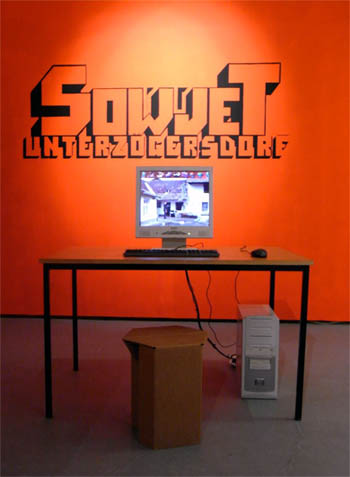 Where? D21 Leipzig. April 18-May 3, 2009. Thursday-Sunday, 1 PM-7 PM. Link Dorkbot Vienna #6: Mamoru Okuno  ETUDE FOR EVERYDAY OBJECTS  Mamoru Okuno: Born in Osaka, 1977. Living in Japan. BFA from City University of New York (2001). In 2003, a sound work "procedure 22:05" was commissioned to be a permanent collection of Izumi City, Japan. In 2005, he toured in France doing solo performances, one at the Espace Pier Paolo Pasolini for example. In 2006, the sound installation "in-visible-room" was exhibited at The National Gallery of Armenia as a part of the first Japanese contemporary art show in Yelevan. The performance series "otozure" was taken places in 3 cities in Japan and 2 cities abroad. The "etude" series was lectured, exhibited and performed also in several cities including Osaka, Tokyo, New York, Quebec and few other. Friday, April 17, 2009. 7 PM @ Metalab Vienna (Rathausstrasse 6, 1010 Vienna) Link monochrom: Hope How Science Fiction Found Religion Once overtly political, the genre increasingly employs Christian allegory.
There is a young man, different from other young men. Ancient prophecies foretell his coming, and he performs miraculous feats. Eventually, confronted by his enemies, he must sacrifice his own life—an act that saves mankind from calamity—but in a mystery as great as that of his origin, he is reborn, to preside in glory over a world redeemed. Tell this story to one of the world's 2 billion Christians, and he'll recognize it instantly. Tell it to a science-fiction and fantasy fan, and he'll ask why you're making minor alterations to the plot of The Matrix or Superman Returns. For reasons that have as much to do with global politics as with our cultural moment, some of this generation's most successful sci-fi and fantasy movie franchises follow an essentially Christian plotline.Link The war against pre-terrorism The Tarnac 9 and 'The Coming Insurrection' On 11 November 2008, twenty youths were arrested in Paris, Rouen and the village of Tarnac, in the Massif Central district of Corrèze. The Tarnac operation involved helicopters, 150 balaclava-clad anti-terrorist policemen, with studiously prearranged media coverage. The youths were accused of having participated in a number of sabotage attacks against high-speed TGV train routes, involving the obstruction of the trains' power cables with horseshoe-shaped iron bars, causing a series of delays affecting some 160 trains. The suspects who remain in custody were soon termed the 'Tarnac Nine', after the village where some of them had purchased a small farmhouse, reorganized the local grocery store as a cooperative, and taken up a number of civic activities from the running of a film club to the delivery of food to the elderly.Link NASA Selects Material For Orion Spacecraft Heat Shield NASA has chosen the material for a heat shield that will protect a new generation of space explorers when they return from the moon. After extensive study, NASA has selected the Avcoat ablator system for the Orion crew module.
 Link Nicolas Mahler's Spam Cartoons Viennese cartoon artist Nicolas Mahler is not deleting spam mails. He is drawing spam mails.
hello. i collected 15.000 spam-mails. i illustrated some of them. you may buy the collection in book form. or just follow this blog. if you`ve got a small dic`k, don`t blame your parents. 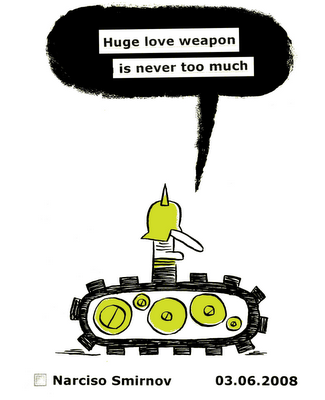 Please check it out. Link The Incest Chart of the Habsburg Family Stand By Me: A Music Collaboration On The Streets Bombing Civilians: An American Tradition Marilyn B. Young is a professor of history at New York University. This excerpt originally appeared in Bombing Civilians: A Twentieth-Century History edited by Yuki Tanaka and Ms. Young.
 Airpower embodies American technology at its most dashing. At regular intervals, the air force and allied technocrats claim that innovations in air technology herald an entirely new age of warfare. Korea and Vietnam were, so to speak, living laboratories for the development of new weapons: the 1,200-pound radio-guided Tarzon bomb (featured in Korean-era Movietone newsreels); white-phosphorous-enhanced napalm; cluster bombs (CBUs) carrying up to 700 bomblets, each bomblet containing 200 to 300 tiny steel balls or fiberglass fléchettes; delayed-fuse cluster bombs; airburst cluster bombs; toxic defoliants; varieties of nerve gas; sets of six B 52s, operating at altitudes too high to be heard on the ground, capable of delivering up to thirty tons of explosives each. A usual mission consisted of six planes in formation, which together could devastate an area one half mile wide by three miles long. Older technologies were retrofitted: slow cargo planes (“Puff the Magic Dragon”) equipped with rapid-fire machine guns capable of firing 6,000 rounds a minute; World War I– era Skyraiders, carrying bomb loads of 7,500 pounds and fitted with four 20-millimeter cannon that together fired over 2,000 rounds per minute.Link Deep in the Heart of Texas: A Bar Fight, A Mother's Wish, and Posthumous Sperm Donation A woman's 21-year-old son dies in a Texas bar fight. The bereaved mom wants the son's clearly virile and tenacious genes to live on in the next generation and fights to have his sperm collected and stored so that someone may carry his seed. She says, on the one hand, that it was always his wish to have children and wants his wishes to be carried out. When the physicians refuse, mother Evans goes to the judge to get her son's sperm out of his body and into a surrogate. She wants someone to carry her grandbaby. Now!Link monochrom: Official Honoree for NetArt and Personal Blog/Culture in The 13th Annual Webby Awards   Frickin' industry leader? We have to tag that! #industry #leader. Link / Official Honorees: NetArt Link / Official Honorees: Blog - Culture/Personal The Pentagon's Bionic Arm In all the wonders of modern medicine, building a robotic arm with a fully functioning hand has not been remotely possible. But that is starting to change. One remarkable leap in technology is called the DEKA arm and it's just one of the breakthroughs in a $100 million Pentagon program called "Revolutionizing Prosthetics."Link (via Peter Hauser, bagasch) The Road to 9/11 Review of Peter Dale Scott's book "The Road to 9/11: Wealth, Empire, and the Future of America".
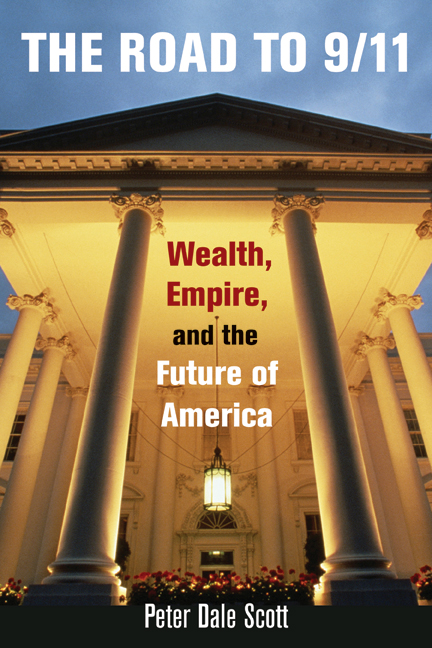 Writing with a touch of the charm of the poet that he is, Dr. Scott has been walking us through this political-historical shadow land for some time now. The Road to 9/11, which as the title indicates, provides historic origins of the terrorist strikes of September 11th 2001, builds on and extends his prior research into secret intelligence activities as presented in his two past UC Press books; Cocaine Politics: Drugs, Armies, and the CIA in Central America (1993) and Deep Politics and the Death of JFK (1996) (among others) by speaking both about current concerns with the Bush-Cheney administration in relations to the events on 9/11/01 and by going further backwards – scrutinizing secret American governmental activities just after the end of World War II. It vividly concentrates on Richard Nixon's failed regime and Tricky Dick's early forays into threatening constitutional democracy as revealed during the Watergate hearings. He then depicts and examines the activities of Nixon's successor Gerald Ford, concentrating on his (what would later become neo-con) team of Donald Rumsfeld and Dick Cheney. Scott pays close attention to the Rumsfeld-Cheney collaboration under Ronald Reagan's regime on what is known as the Continuity of Government (COG) strategy: a parallel planning structure in lieu of nuclear war which includes plans for warrantless surveillance, suspension of habeas corpus, and the arrangements for mass detention; proposals which can also be described as plans for a potential military-civilian coup. By now the narrative of shadow government - what Scott calls "deep politics" – has taken hold and the book begins to read like an airport page-turner; scorching the eyes with tale after tale of intrigue and deception. But the characters are real (Kissinger, Casey, Brzezinski, Carter, Reagan, the Rockefellers, bin Laden, Clinton, et al) and the events - which rotate around big oil, terrorism, drug trade, arms deals, covert financing and secret security configurations are heavily documented in the copious footnotes (which I equally read with jaw-dropping fascination). Highlighted are the adventures of multiple intelligence agencies and their involvement with terrorist organizations that they once backed and helped create, including al Qaeda. At this point Scott's deep political analysis has a kind of Rimbaudian poetics to it, astutely avoiding moral condemnation. He is just letting the deviant facts speak for themselves.Link Compassion: Easier For A Broken Leg Than Heart When we see someone with a broken leg, we feel his pain instantly. But it takes a bit longer to feel compassion for a broken heart, say researchers from the University of Southern California.Link The Sales Effort and Monopoly Capital On the eightieth anniversary of the 1929 Stock Market Crash that led to the Great Depression, the United States is once again caught in a Great Financial Crisis and deep downturn of an order of magnitude comparable to the 1930s. At the center of this crisis is plunging consumer spending, caused by the destruction of household finance as a result of decades of wage stagnation and the piling up of debt. Consumer spending in today's economy, dominated by giant firms, is significantly dependent on the sales effort, i.e., marketing as a whole, with advertising as its most conspicuous form. But the sales effort is also ebbing in the crisis, contributing to the general decline. So integral is the sales effort to the regime of monopoly capital that one cannot be understood without the other.Link Falco staircase in Minneapolis!   The city remembrance society hereby dedicates this staircase to Falco, the most recognized Austrian composer of the twentieth century. 1958-1998. Keep track of the Falcostiege movement here: Link Marvin Minsky is worried about robots and umbrellas Marvin Minsky is worried that after making great strides in its infancy, AI has lost its way, getting bogged down in different theories of machine learning. Researchers "have tried to invent single techniques that could deal with all problems, but each method works only in certain domains." Minsky believes we’re facing an AI emergency, since soon there won't be enough human workers to perform the necessary tasks for our rapidly aging population.Link Scientists Pinpoint The 'Edge Of Space' Where does space begin? Scientists at the University of Calgary have created a new instrument that is able to track the transition between the relatively gentle winds of Earth's atmosphere and the more violent flows of charged particles in space – flows that can reach speeds well over 1000 km/hr. And they have accomplished this in unprecedented detail.
Link The world after Keynes Keynes is back in fashion, but his policies did not give to the state – at all levels – the leading role in investment that is now necessary, argues Stuart Holland. What is required is a radical rebalancing of relations between economic and social power, led by democratised state institutions.
Link Saudi judge upholds man's marriage to 8-year-old A Saudi mother is expected to appeal a judge's ruling after he once again refused to let her 8-year-old daughter divorce a 47-year-old man, a relative said.Link Do Parents Matter? A researcher argues that peers are much more important than parents, that psychologists underestimate the power of genetics, and that we have a lot to learn from Asian classrooms.
Link Sarah Palin's "I Kid You Not": Knowingness and Other Shallows Raymond Tallis dives in head first.
"You've heard about some of these pet projects, they don't really make a whole lot of sense and sometimes dollars go to projects that have little or nothing to do with the public good. Things like fruit fly research in Paris, France. I kid you not."Link From Fatwa to Jihad: The Rushdie Affair and Its Legacy A review of Kenan Malik's book "From Fatwa to Jihad" (Atlantic).
Alarmed by race riots in the 1980s, local and national government in Britain embarked on a multicultural strategy. Respect was to be accorded to different ways of life and, fatally, these ways of life were to be classified as communities with their own "community leaders".Link Social Media Networks Are Music's Curse and Salvation A new report says the same social media sites that threaten the old-school, sales-based approach will eventually save whatever's left of the music business. Social music may not generate much revenue now, but monetization's effectiveness must -- and will -- improve.Link Making Sense of Things: The Tradescant's Ark Experiment In a video published by Edge, archeologist Tim Taylor conducts an experiment about making sense of things.
"There are 43 stones passing amongst you. It's called the Tradescant's Ark Experiment and I've named it in honor of John Tradescant and John Tradescant, Sr. and Jr., father and son, who were collectors of things in the 17th century. They were the exhibitors of the world's first pay-to-view museum and they had a cabinet of curiosities set up in Lambeth, on the Thames, which much later was sold to Elias Ashmole and became the germ of the Ashmolean Museum. Not much of it survives, there are little parts of it in the Ashmolen Museum. What is more important is the intellectual move they made in the catalog, which John Tradescant the younger created and in which he distinguished between 2 types of things, naturalls and artificialls. He divided all the things he collected into those he thought were natural and those that were modified by human hand—what archaelogists today call artifacts."Link Drunken Nation: Russia's Depopulation Bomb A specter is haunting Russia today. It is not the specter of Communism—that ghost has been chained in the attic of the past—but rather of depopulation—a relentless, unremitting, and perhaps unstoppable depopulation. The mass deaths associated with the Communist era may be history, but another sort of mass death may have only just begun, as Russians practice what amounts to an ethnic self-cleansing.Link French Bill Would Bar Illegal Downloaders From Internet Anyone repeatedly caught illegally downloading films and music in France could be cut off from the internet if a new bill is passed by parliament this week. The bill would give French authorities powers to trace illegal downloads and cut repeat offenders off from the internet for a period of two months to one year.Link Earth's "Great Oxidation Event" The Earth's original atmosphere held very little oxygen. This began to change around 2.4 billion years ago when oxygen levels increased dramatically during what scientists call the "Great Oxidation Event." The cause of this event has puzzled scientists, but researchers writing in Nature have found indications in ancient sedimentary rocks that it may have been linked to a drop in the level of dissolved nickel in seawater.
Link The Dark Side of Dubai This is an excellent article, and it is quite long.
Once the manic burst of building has stopped and the whirlwind has slowed, the secrets of Dubai are slowly seeping out. This is a city built from nothing in just a few wild decades on credit and ecocide, suppression and slavery. Dubai is a living metal metaphor for the neo-liberal globalised world that may be crashing – at last – into history.The best monuments are unintentional and hard to get rid of, like the anti-air-raid towers ("Flak-Türme") that dot Vienna. The ruins of Dubai will be a monument to the arrogance of our age. Link Galileo: Heretic's middle finger on display Galileo's shrivelled finger is to go on display in an exhibition in Florence to mark the 400th anniversary of his first observation of the skies. The middle digit from his right hand was removed from his corpse in 1737 when his body was transferred to a mausoleum. Galileo was condemned by the Catholic Church as a heretic during his lifetime but the Vatican has become more tolerant toward him in recent years.
Link 8 out of 10 Britons unaware of Darwin anniversary Only 21% of people know that 2009 is Darwin's anniversary year, according to a new poll published by Theos today, on the 149th anniversary of the publication of the Origin of Species.Link Quantum lasers: Half light, half matter The polariton, or exciton polariton, to give it its full name. How can such a particle be light and matter simultaneously? As is so often the case, the secret lies in the weirdness of quantum physics. Polaritons are not the kind of beasts you can expect to see in the wild. First bred in 1991 by researchers at the University of Tokyo, Japan, they spend the entirety of their short lives in tiny mirrored cages known as semiconductor microcavities.Link Financial Regime Change? As stock markets plunge and governments scramble to bail out the finance sector, Robert Wade argues that we are exiting the neoliberal paradigm that has held sway since the 1980s. Causes and repercussions of the crisis, and errors of the model that brought it to fruition.
Link Yuri's Night / Vienna 2009  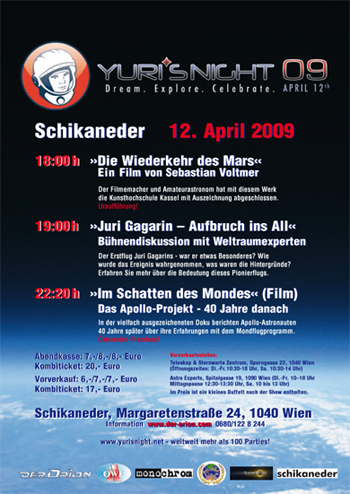 April 12, 2009. First film 6 PM, show at 7 PM. Bug eats electricity, farts biogas Single-celled organisms that can convert electricity into methane could help solve one of the biggest problems with renewable energy – its unreliability compared to the steady output of polluting fossil-fuel power stations.
Link 'Born in the USA' turns 25 Bruce Springsteen's Born in the USA turns 25 this year. The iconic song is perhaps one of the most misunderstood pieces of art in the history of global popular culture. Read it carefully, and it conveys a message that is at odds with the mythology and misplaced anti-Americanism that surrounds it. It is worth reflecting on both the history of the song and how the message it contains is as relevant in 2009 as it was in 1984. We may also reflect on how, in recent years, Springsteen has thrown his own legacy into question, as one-time voice of the working classes, by engaging in commercial activities that have disappointed loyal fans (and added a new layer of complexity to our understanding of the relationship between artist, art and fan).Link Capitalism is Dead, Long Live Capitalism? Recognizing the collapse of the Anglo-Saxon model of free-market Capitalism, its global votaries have put their heads together to salvage Capitalism from its ruins.Link Pun for the Ages Addison defined the pun as a "conceit arising from the use of two words that agree in the sound, but differ in the sense." "Energizer Bunny Arrested! Charged with Battery." No laugh? Q.E.D.Link Economic Secrets of the Wizard of Oz The Wonderful Wizard of Oz is one of the world's best-loved fairytales. As Judy Garland's famous film nears its 70th birthday, how much do its followers know about the story's use as an economic parable?
Link The Terror: Civilization, Decadence, and Hope By Colin Campbell.
Civilization, we have heard for at least three thousand years, is in decline; its old values have faded, and all that is left is cynical, stupid, short-sighted self-interest. Our world has become shallow, ugly and weak.Link Bollywood Going On Strike Producers are demanding a 50% share in the revenues generated by the cinemas. Owners say the share should be lower if a film performs poorly. India's film industry, the world's largest, has already been badly affected by the global economic crisis. The indefinite strike is expected to begin on Saturday.Link Why Biofuels Are the Rainforest's Worst Enemy With governments and consumers scrambling for alternatives to fossil fuel, worldwide demand for biofuels has gone through the roof; in Europe, where more than half of all automobiles run on diesel, consumption of biodiesel is set to triple by 2010. US subsidies for biofuels, mostly ethanol, will add up to $92 billion between 2006 and 2012, and producers in developing countries like Indonesia are often eligible for millions of dollars in development money from the World Bank.Link The End of the Music Album as The Organizing Principle It doesn't seem that long ago since Radiohead did what was once unimaginable - release an album without being signed to a major record company. On the long march to digital ubiquity as the means of music delivery Radiohead avoided the tar pit that seems to be major label thinking and came out clear winners. Yes, they resorted later to releasing the album as a good old CD into regular retail distribution but they were pioneers and were soon followed with great success by Nine Inch Nails and to lesser success by many others. Both these bands had an understanding of what their fans wanted [price level choice, quality and special packaging] and both bands understood the power of the internet for marketing purposes and direct reach. [NB: Although I believe that the digital music file will rule the day, vinyl still has a role to play and I'll get to that later.]Link (via qburns) Soviet Unterzoegersdorf / Sector 2: Public Walkthrough  Raum D, Museumsquartier, Vienna; April 9, 2009; 8 PM. monochrom @ re:publica 2009  Link [The Archives] 
. . . . . |
. . monochrom is an art-technology-philosophy group having its seat in Vienna and Zeta Draconis. monochrom is an unpeculiar mixture of proto-aesthetic fringe work, pop attitude, subcultural science, context hacking and political activism. Our mission is conducted everywhere, but first and foremost in culture-archeological digs into the seats (and pockets) of ideology and entertainment. monochrom has existed in this (and almost every other) form since 1993.
[more] Booking monochrom: [Europe] [USA] External monochrom links: [monochrom Wikipedia] [monochrom Flickr] [monochrom blip.tv] [monochrom GV] [monochrom Youtube] [monochrom Facebook] [monochrom iTunes] [monochrom Twitter] 
[ P r o j e c t s ] Soviet Unterzoegersdorf / Sector 2 / The Adventure Game Krach der Roboter: Hello World! Slacking is killing the DIY industry (T-Shirt) Carefully Selected Moments / CD, LP Freedom is a whore of a word (T-Shirt) International Year of Polytheism 2007 Santa Claus Vs. Christkindl: A Mobster Battle Kiki and Bubu and The Shift / Short film Kiki and Bubu and The Privilege / Short film Kiki and Bubu and The Self / Short film Kiki and Bubu and The Good Plan / Short film Kiki and Bubu and The Feelings / Short film / Short film Soviet Unterzoegersdorf / Sector 1 / The Adventure Game I was a copyright infringement in a previous life (T-Shirt) Firing Squad Euro2008 Intervention I can count every star in the heavens above -- The image of computers in popular music All Tomorrow's Condensations / Puppet show The Redro Loitzl Story / Short film Law and Second Order (T-Shirt) They really kicked you out of the Situationist International? When I was asked to write about new economy Arse Elektronika 2007, 2008, 2009 etc. The Void's Foaming Ebb / Short film The Charcoal Burner / Short film Fieldrecording in Sankt Wechselberg / Short film Campaign For The Abolition Of Personal Pronouns Entertainment (Unterhaltung) / Short film Nicholas Negroponte Memorial Cable Experience the Experience! (West Coast USA/Canada Tour 2005) A Holiday in Soviet Unterzoegersdorf Massive Multiplayer Thumb-Wrestling Network Soviet Unterzoegersdorf Metroblogging Every Five Seconds an Inkjet Printer Dies Somewhere 452 x 157 cm² global durability Blattoptera / Art for Cockroaches An attempt to emulate an attempt The Department for Criticism against Globalisation Disney vs. Chrusov / Short film Turning Threshold Countries Into Plows Roböxotica // Festival for Cocktail-Robotics Cracked Foundation For The Fine Arts Oh my God, they use a history which repeats itself! (T-Shirt) Administrating:  . . . . . |
|||


